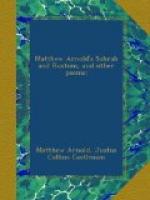=54.= Why “down swung the sound of a far-off bell”? [166]
=81. seal’d.= Fastened; fixed intently upon, as though spellbound.
=89-93. Hark ... sun.= In her song Margaret shows she is still keenly alive to human interests, temporal and spiritual. The priest, bell, and holy well (l. 91) symbolize the church, here Roman Catholic. The bell is used in the Roman Church to call especial attention to the more important portions of the service; the well is the holy-water font.
=129. heaths starr’d with broom.= The flower of the broom plant, common in England, is yellow; hence, starr’d.
In his work on Matthew Arnold, George Saintsbury speaks
of this poem as follows: “It is, I believe,
not so ‘correct’ as it once was to admire
this [poem]; but I confess indocility to correctness,
at least the correctness which varies with fashion.
The Forsaken Merman is not a perfect poem—it
has tongueurs, though it is not long; it has
its inadequacies, those incompetences of expression
which are so oddly characteristic of its author; and
his elaborate simplicity, though more at home here
than in some other places, occasionally gives a dissonance.
But it is a great poem,—one by itself,—one
which finds and keeps its own place in the fore-ordained
gallery or museum, with which every true lover of
poetry is provided, though he inherits it by degrees.
None, I suppose, will deny its pathos; I should be
sorry for any one who fails to perceive its beauty.
The brief picture of the land, and the fuller one
of the sea, and that (more elaborate still) of the
occupations of the fugitive, all have their charm.
But the triumph of the piece is in one of those metrical
coups, which give the triumph of all the greatest
poetry, in the sudden change from the slower movements
of the earlier stanzas, or strophes, to the quicker
sweep of the famous conclusions.”
[167]
What is the opening situation in the poem? Have
the merman and his children just reached the shore,
or have they been there some time? Why so?
Why does the merman still linger, when he is convinced
that further delay will count for nothing? Why
does he urge the children to call? What is shown
by his repeated question—“was it yesterday”?
Tell the story of Margaret’s departure for the
upper world, and discuss the validity of her reason
for going. Do you think she intended to return?
What is the significance of her smile just before departing?
Give a word picture of what the sea-folk saw as they
lingered in the churchyard. Will Margaret ever
grieve for the past? If so, when? Why?
Who has your sympathy most, Margaret, the forsaken
merman, or the children? Why? Do you condemn
Margaret for the way she has done, or do you feel
she was justified in her actions? Discuss the
versification, giving special attention to its effect
on the movement of the poem.




